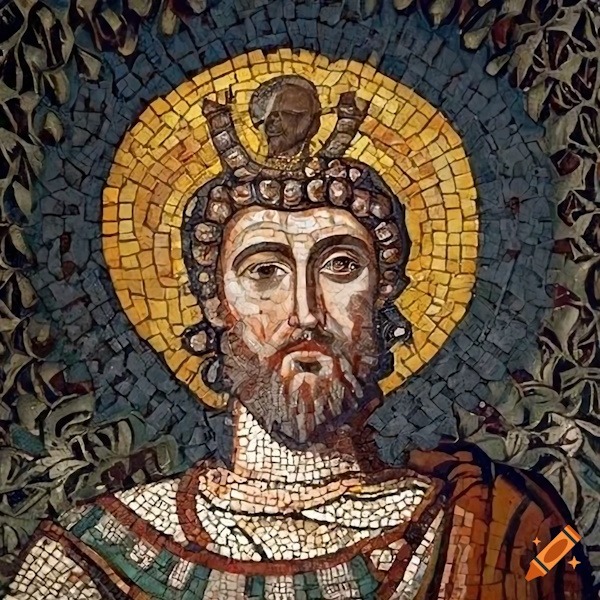

A mosaic depicting Emperor Julian the Apostate wearing a pearled diadem on his head with a halo made of laurel leaves. A wonderful production from the people at craiyon.com.
A beautiful letter from a beautiful man
In one respect, Julian resisted the teachings of Master Mardonius: he never accepted that even the most perfect literary description could ever match the beauty of nature. And he remained sensitive to nature all his life. We see this in a letter he wrote in his later years, but which refers to the memories of his boyhood spent in and around Nicomedia. The letter is addressed to the rhetorician Euagrios. Here are the highlights:
I give you as a gift a small estate of four fields in Bithynia, once given to me by my grandmother. Dispose of it as you please. It is too small to support anyone, let alone make him rich. However, it does not lack its charms, and I would like to tell you something about them. The estate is located about three miles from the sea. So no tourist nor sailor will disturb your peace with their nosey chatter. Yet, the place is not without the gifts of Nereus. Fish are easy to come by, fresh, and still jumping. And when you step out of the house and stand on one of the hills, you will encompass with your eye the Sea of Propontis, its isles and even the city named after the noble emperor. But you won’t tread on algae or barnacles, and you won’t be irritated by the foul and indefinable filth that the sea sometimes dumps on the coast.
You reach the hill through dry vegetation, through fragrant herbs and tall thyme. And when you go there to read, you will have profound silence all around. And when you look up to give his eyes respite, how nice it will be to see the ships at sea! When I was but a little boy, this summer resort seemed to me the most precious place in the world.
There are also springs there that are not bad at all, delightful places to bathe, and gardens and trees. When I grew up, I longed for those summers of my youth and returned to the place more than once; the returns always brought me some spiritual benefit.
The scene is full of charm, color, and warmth, and is almost symbolic. A boy lies on a seaside hill among intoxicating, fragrant herbs and flowers. He reads Homer’s poems or Plato’s dialogues. From time to time, he raises his eyes and looks at the blue waters of the bay, at the rocky islands scattered about—couldn’t one of them be the island of the nymph Calypso?—and at the ships and fishing boats quietly gliding by. Somewhere very far away, shimmer in the haze the white houses of Constantinople, his hometown, where his father and mother lie buried.
The letter continues:
There are also some remains of my own work on the land: a small vineyard, yielding fragrant and sweet wine, requiring no flavoring, for the grapes smell of roses already on the bed and in the press. Homer must be right: that must in clay jugs is surely the essence of divine ambrosia.
You will ask why there are no more vine-beds there, and why only such a small piece of land was ever cultivated. Well, apparently, I was not a very industrious farmer. Perhaps because I only drink diluted wine? Besides, I only prepared this wine for myself and my friends, and those were never more than a handful.
Now, my precious head, I give you this gift—modest, it is true, but nice nevertheless, because it passes from friend to friend; that is, as the wise poet Pindar says, from home to home.
I wrote this letter in a hurry, by lamplight. If I made any mistakes, do not judge me too harshly.
And so, in his youth, Julian tried his hand at viticulture. Being too young, he probably never realized how badly things were going in another vineyard: the Lord’s vineyard.
Aleksander's Antiquities
Explore antiquity through Aleksander Krawczuk's captivating lens.
CONTACT
NEWS
a.krawczuk@mondrala.com
+352691210278
© 2025. All rights reserved.


